The cauliflower-picking robot funded by the EU that is set to replace migrant workers for short-staffed farmers in Cornwall
- A robot is being developed which can harvest vegetables without a human
- Sensors and cameras can detect when it is ready and it can be gently harvested
- It is expected to replace migrant workers that currently do the job post-Brexit
The vegetables you eat with your Sunday roast may soon be picked by a robot.
Farmers in Cornwall are testing a machine invented using European funding that picks cauliflowers from the field without bruising them.
It works in a similar way to the human hand by squeezing each cauliflower before deciding whether it is ready to be harvested.
The GummiArm robot is believed to be a answer to any migrant staff shortages that may arise when the UK leaves the EU.
Scroll down for video
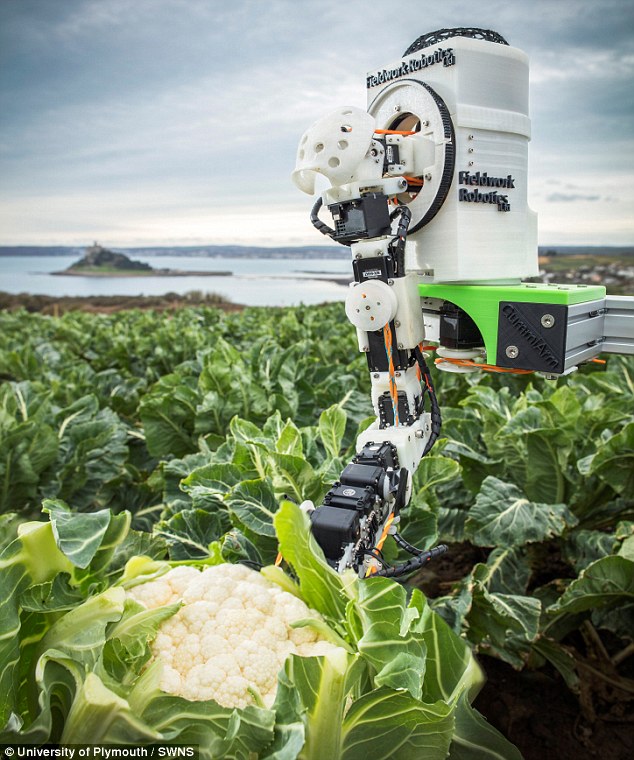
A cauliflower picking robot has been developed which can tell when the vegetable is ready for harvest and pull it out of the ground without damaging it. Vegetable harvesting can be difficult and is often inefficient, time-consuming and expensive
The robotic cauliflower-picking arm is the work of Dr Martin Stoelen at the University of Plymouth.
'A lot of producers are very worried about where they will get their reasonably priced manual labour from – and rightly so,' says Dr Stoelen.
'Manual harvesting also represents a large portion of their total costs, often it can be up to 50 per cent, so looking at addressing that, especially against a backdrop of Brexit, is very important.'
Harvesting cauliflower can be difficult because the vegetable can be bruised easily.
The robot first assesses each cauliflower to make sure its head is firm and white using cameras and sensors on its 'fingers'.
It then gently removes it from the stem with just a few leaves attached.
Currently, farmers harvest fields all at once, in a practice known as slaughter harvesting.
But this method leads to up to 60 per cent of the crop being wasted, because it is either wonky or inedible.
Many other robotic approaches in farming focus on machinery advances but the scientists from the University of Plymouth looked to replicate the human hand.
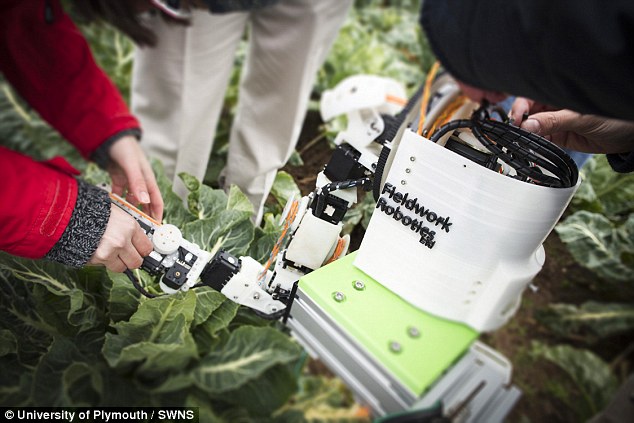
The robotic cauliflower-picking arm has been developed by the University of Plymouth. Currently, the robot is being tested on the fields of Cornwall
The project has been named the ABC (Automated Brassica harvest in Cornwall).
David Simmons is Managing Director of Riviera Produce, which is a partner in the ABC project, and has been working in the industry for 30 years.
His family has farmed at Hayle in Cornwall since the 1870s.
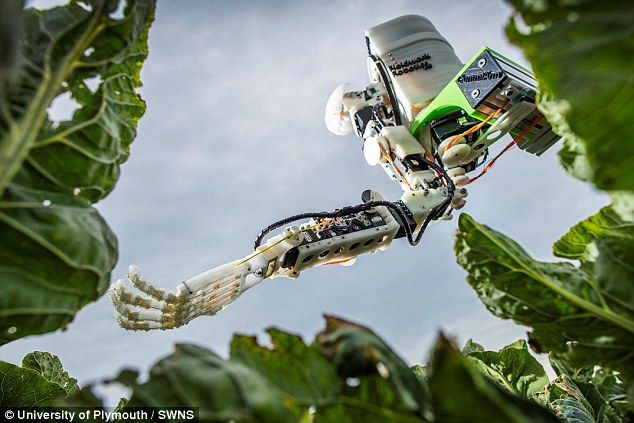
Harvesting cauliflower can be a difficult task. The head must be firm and white and then it must be gently removed from the stem with a few leaves attached. This process must be done gently as the vegetable can bruise easily
Harvest time on farms is often dominated by migrant workers, and the impeding Brexit has raised concerns about a shortage of workers to pick the crops.
Mr Simmons said: 'Harvesting costs can be up to 40 per cent of the costs of production of brassicas and skilled labour to do the harvesting is getting increasingly difficult to obtain, especially with Brexit fast approaching.
'In a very competitive market place where our customers demand cheap food, the cost of harvesting is continually rising.
'Robotic harvesting has the potential to increase productivity and control the costs.'
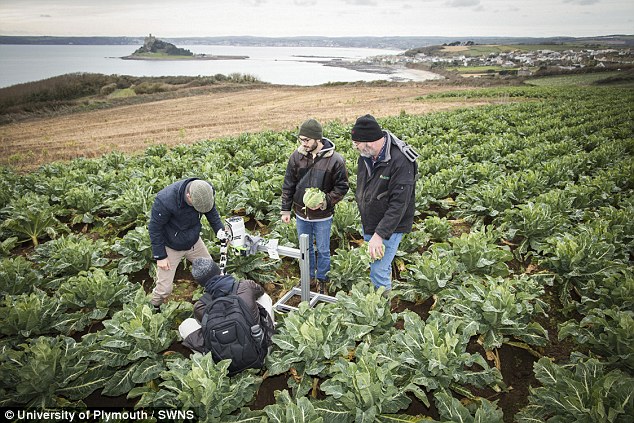
Harvest time on farms is often dominated by migrant workers, and the impeding Brexit has raised concerns about a shortage of workers to pick the crops. Researchers claim that following Brexit, robots will replace the migrant workers that currently pick crop
Dr Stoelen claims the use of robotics will make life 'easier and simpler' for farmers.
He said: 'Machines could even be 'repurposed' throughout the growing season, allowing the core technology to be rolled out to other operations – such as weeding or the application of pesticides.
'If the robot is reconfigurable, it could be relevant to other brassicas and indeed other crops. It's also cool technology which might encourage more young people to choose a career in agriculture.'
As well as reducing costs for farmers and the agriculture industry, the robots would also reduce the risk of incidents where humans are wounded by heavy machinery.
The technology is still in a developmental phase but is expected to be available in two to three years for a variety of different crops.
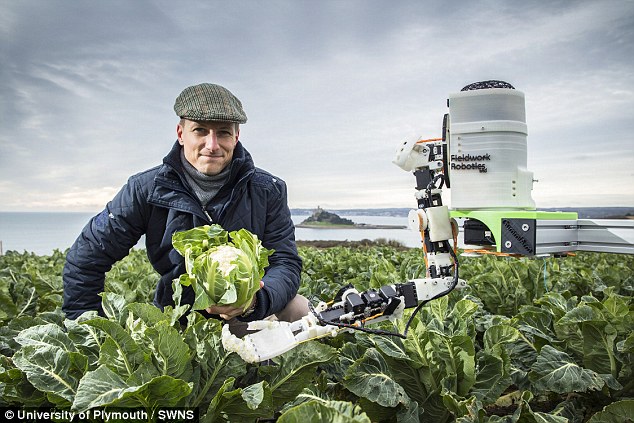
The technology is still in a developmental phase but is expected to be available in two to three years for a variety of different crops
The robots are expected to be able to move independently and gather crops, but there is scope for even more tech to be included in them.
As they record data moving through the fields, there is a possibility they could provide detailed analysis of soil quality and other factors to improve a farmer's yield long-term.
'These robots are going to be a massive big-data application,' added Dr Stoelen
'This technology is evolving rapidly, costs are coming down and developments can happen fast which means it's not too long before technology like this becomes a practical and commercially viable reality.
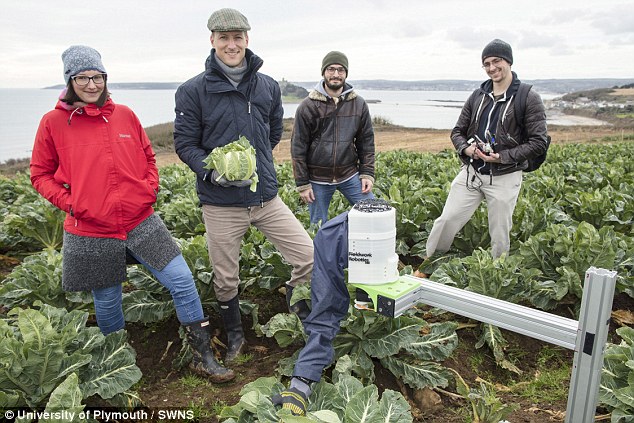
The automated farmer is fitted with cameras and sensors in its fingers to asses crop growth. It processes this information to determine if the plant is ready for harvest or should be left
'A lot of producers are very worried about where they will get their reasonably priced manual labour from – and rightly so.
'Manual harvesting also represents a large portion of their total costs, so looking at addressing that, is very important.'
The project is supported by the Agri-tech Cornwall Project, a £10 million ($13.8 million) fund from the European Union.
Robin Jackson, director of the Agri-tech Cornwall Project said:'Farmers have always been pioneers as far as technology is concerned, but the scale of the current challenges we face means we now need a step-change in terms of the rate at which the whole land-based sector develops and applies new technology.
'It will help address global issues, such as feeding the growing population and mitigating climate change, but it will also boost profit and efficiency at an individual farm level.'
Most watched News videos
- TikTokers provide inside look at the line for Bonnie Blue's marathon
- Man declares 'mission accomplished' as he gives Bonnie Blue a cap
- Incredible moment homeless mum dog carries dying pup to vets
- Moment Russian influencer throws two-month-old son into a snowdrift
- Shocking moment transgender girl is set upon by masked teenage mob
- Shocking moment woman hits a police officer and leaves her in tears
- Fiery debris falls over Turks and Caicos Islands after SpaceX explosion
- Woman is arrested for bad behavior at Ohio car wash
- Moment 'trans hate mob' ringleader Summer Betts-Ramsey is arrested
- Shocking moment transgender girl is set upon by masked teenage mob
- Brazilian martial artist tackles handbag thief to the ground
- California grandma remains positive despite losing home in fires














































































































































































